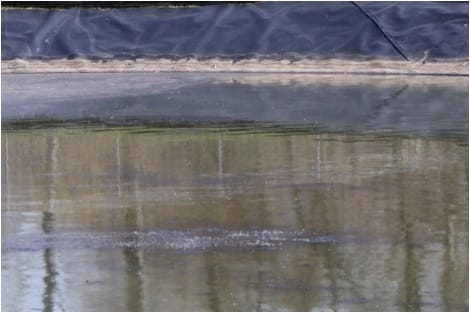Lagoon Odor Control is the second installment of our 3-part blog series discussing the deleterious side effects of summer heat on wastewater lagoons. Our first installment focused on Lagoon Algae Control; this is Part 2, which will be focusing on lagoon odor causes, effects and solutions.
Causes of lagoon odor in your wastewater lagoon in the summer:
Anaerobic digestion can create faint bubbling on the surface of the water, as odorous gases are being released into the atmosphere, causing wastewater lagoon odor. Warmer water temperatures—As the ambient temperature increases, so does your lagoon water temperature. As a result, aerobic bacteria in your lagoon become more active and begin digesting lagoon BOD and other nutrients at a faster rate. The warmer the water becomes, the more active they are and the more oxygen they consume, thereby resulting in low lagoon DO (Dissolved Oxygen).
- Increase in Anaerobic Digestion —Low lagoon DO (Dissolved Oxygen) coupled with warmer lagoon temperatures can lead to an increase in anaerobic digestion at the bottom of the wastewater lagoon. Anaerobic digestion releases sulfur dioxide, along with a variety of other noxious gases that are the causes of lagoon wastewater odor.
What’s happening in your wastewater lagoon when you have lagoon odor:
- Treatment is most likely suffering—Lagoon odor is often a sign that more anaerobic digestion is occurring than aerobic. Given that aerobic digestion is exponentially faster than anaerobic digestion, it is quite likely that the wastewater is being undertreated. In addition to treatment deficiencies (noticeable in your lagoon’s effluent), a lack of aerobic digestion will lead to an increase in lagoon sludge, which will eventually require removal at great expense. Read Causes and Effects of Wastewater Lagoon Sludge Explained for more on this topic.
- Neighbors and employees get upset—When these wastewater odor-causing gases are released into the atmosphere, they result in a natural lagoon odor that can be quite offensive to both operators and, when carried by winds, to people who live or work nearby. No one likes being around unpleasant odors all day. Having a smelly wastewater lagoon tends to ruffle feathers and cause bad press for a municipality.
How to control lagoon odor in your wastewater lagoon:
- Increase lagoon DO—By increasing lagoon DO, you will ensure that the aerobic bacteria have the oxygen they need to aerobically digest the lagoon BOD. In turn, this will help to control wastewater lagoon odor as anaerobic digestion will slow down and the resultant odors will be reduced. For proper lagoon odor control, an operator should target a dissolved oxygen level of approximately 2 mg/L. To do this,
lagoon operators should ensure that their aeration system is functioning properly. If they have a diffuser system with a redundant blower and a header sized with excess capacity, then consider putting additional air into the system during the hottest days. If your aeration system is antiquated and in need of an upgrade, you may want to consider lagoon aeration alternatives.
- Increase Wastewater Circulation—The second step to lagoon wastewater odor control is to ensure that the DO is reaching the very bottom of the lagoon where the odor-causing anaerobic digestion occurs. By circulating the water column effectively, you can create near homogeneous dissolved oxygen content that will in turn promote odor-free aerobic digestion. Surface aerators generally only circulate the first six feet of the water column; as a result, they struggle to circulate deeper lagoons. While fine bubble diffusers do a better job of circulating, coarse bubble static tube diffusers are the most effective.
Download Now to see how Ares Aeration® can achieve lagoon odor control.


